Soft and tender sheets of rice noodle filled with sweet and savory roasted pork, drizzled with seasoning sauce and topped with chopped scallions–cheung fun is one of my go to dim sum dishes.
This thinly steamed rice paper that is often brimming with various fillings and rolled altogether tastes the best when it’s fresh out of the steamer. With this recipe, you can make it fresh at home anytime!
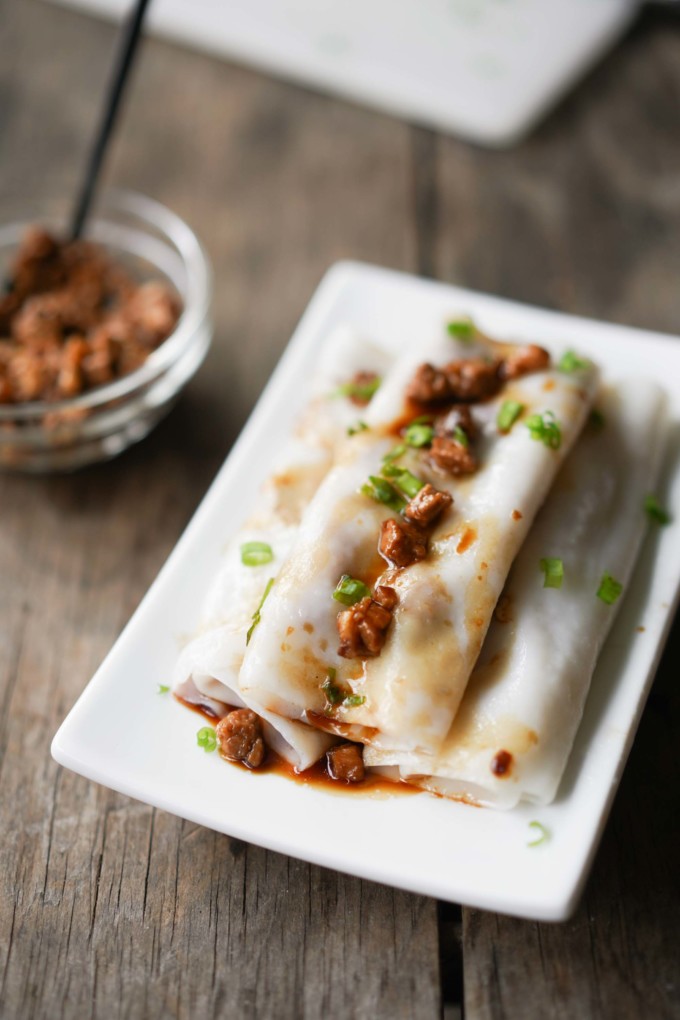
Where can you buy cheung fun?
Cheung fun, also known as cheung fan, is a traditional Cantonese dish with Guangdong origins and translates to “steamed rice roll.” These rice noodles come in steaming plates straight off of dim sum carts in restaurants or street carts all over the world, typically for breakfast. Using rice noodle rolls as a base is simple, but also allows for many different variations when we talk about fillings.
Often you can find fillings of shrimp, roasted pork (char siu), beef, vegetables, or even fried dough (youtiao) and topped with drizzles of different seasoning sauces. Some varieties are also based on region, for example, in Malaysia they have a variant called chee cheong fun, which is served with sweet shrimp paste, fried shallots, and sesame seeds.
Similarities to Vietnamese bánh cuốn
In Vietnam they have bánh cuốn, which is an often thinner style rice noodle roll filled with ground pork, wood ear mushrooms, and fried shallots. It’s served and topped with nước chấm. It’s often thought that bánh cuốn originated from cheung fun through migration, as with other versions of this dish, and it’s so similar that there must be truth to this.
Tools needed to make this
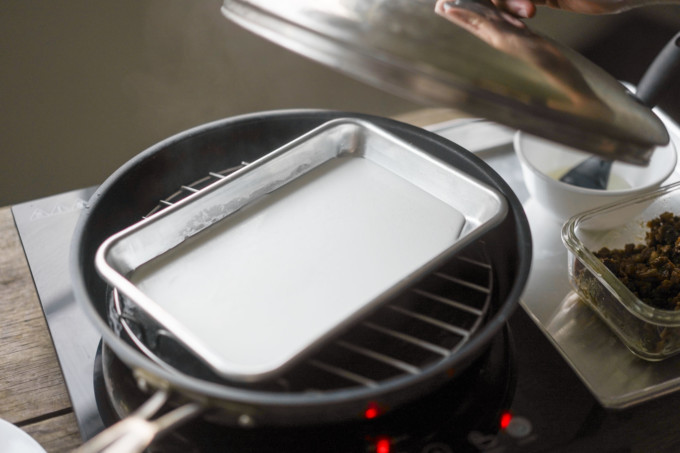
When I first learned how to make cheung fun at home, I was a little worried about not having the right tools to make thin and soft rice paper. While my mom made plenty of bánh cuốn at home–perfectly steamed to the right thickness every time–she also had a cheese cloth steamer contraption that my dad handmade for her.
Since bánh cuốn is a lot thinner than cheung fun, I found that you can replicate the rice noodle rolls two ways: buying a steamer box or creating a makeshift steamer box using a rectangular tray, a large saucepan or pot with a lid, and a rack to raise the tray above the water. I went for the latter since I had everything at home.
You want to make sure that the saucepan or pot is large enough so that the tray fits perfectly inside and that its sides are big enough for the tray to sit on a rack above water. I would also recommend NOT using a pot with sides that are too high because this could restrict your hand movements for rolling the rice noodle paper while steaming–it also gets pretty hot in the steamer so you want to roll as quickly as possible.
For this recipe, I used a quarter sheet pan, a 12 inch saucepan, a circular wire rack from 99 Ranch, and a lid for the pan. I also used a whisk to combine all the ingredients and a silicone spatula to help roll the steamed rice noodle.
Cheung fun / rice noodle roll ingredients
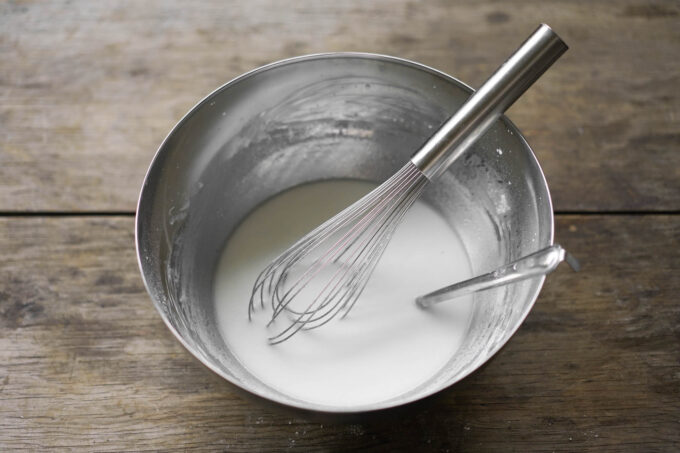
The ingredients for these rice noodle rolls take two sets of different types of flours and starches that you can find in many Asian grocers: rice flour, glutinous rice flour, tapioca starch, and potato starch. Please note this recipe calls for TWO different types of rice flour, this is very specific so make sure to purchase regular rice flour and glutinous rice flour.
In addition to the flours, we also mix in salt and filtered water to bring the liquid together. If you want to adjust the texture to your preference, you can also the ratios for tapioca and potato starch.
Char siu filling ingredients
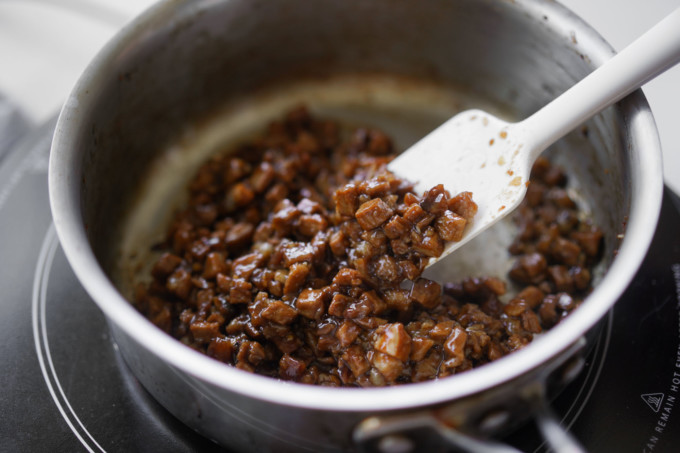
For this recipe’s filling, I used char siu because pork is amazing! All you need is roasted char siu from your local Chinese restaurant or grocery store, or leftovers char siu from your Chinese meals. Recipe for making this at home is coming soon! Here’s my recipe for homemade char siu!
For the sauce you’ll need oyster sauce, light soy sauce, dark soy sauce, sugar, five spice powder, garlic, sesame oil, and water and cornstarch mixture.
Similarly, the drizzle of seasoning sauce each roll gets before serving contains dark soy sauce, lighter soy sauce, sesame oil, sugar, water, and oyster sauce.
Char siu filling instructions
Step 1. In a large mixing bowl, combine all the flours, starches, and salt with a whisk.
Step 2. Add the water to the flour mixture and whisk thoroughly. Whisk the contents quickly so they don’t clump. Let this liquid rest for at least 20 minutes.
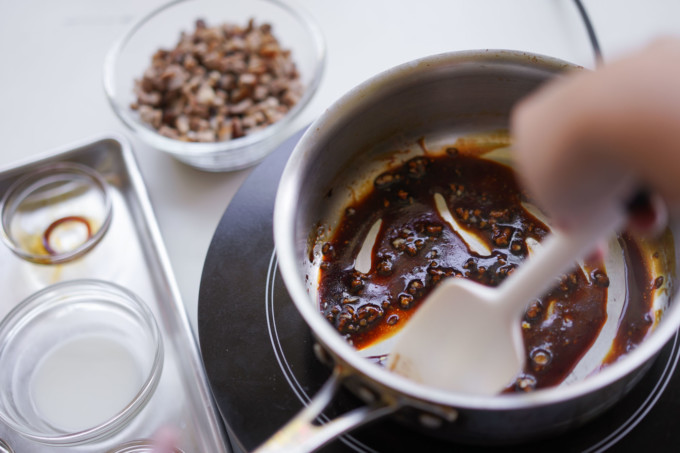
Step 3. While your liquid is resting, you can prep your char siu filling by chopping your char siu into small pieces. In a saucepan, combine the oyster sauce, light and dark soy sauces, sugar, five spice powder, garlic, and sesame oil. Turn on the heat to medium-high and stir. In a small bowl mix together the cornstarch and water until it’s dissolved, then mix into the saucepan. Wait for this sauce to boil, then lower it to medium and cook for another two minutes or until it reaches the consistency of molasses. Add the char siu and cook for an additional one minute. Remove from the heat and then rest until you add the filling.
Seasoning sauce instructions
Make your sauce by adding dark soy sauce, light soy sauce, sesame oil, sugar, water, and oyster sauce together in a small pan over medium low heat until the sugar dissolves. Place into a container and leave it on the counter until you are ready to drizzle onto the rolls.
Cheung fun / rice noodle roll instructions
Step 1. In your saucepan or pot, add the wire rack and add enough water so that it sits slightly underneath the rack. Add your tray on top and cover with the lid. Preheat your steamer before putting the cheung fun liquid.
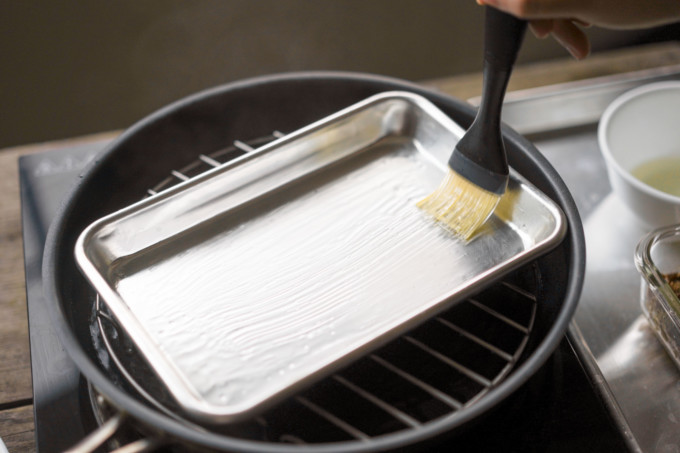
Step 2. Using a brush, lightly spread some oil on the tray to prevent your rice paper from sticking when it steams.
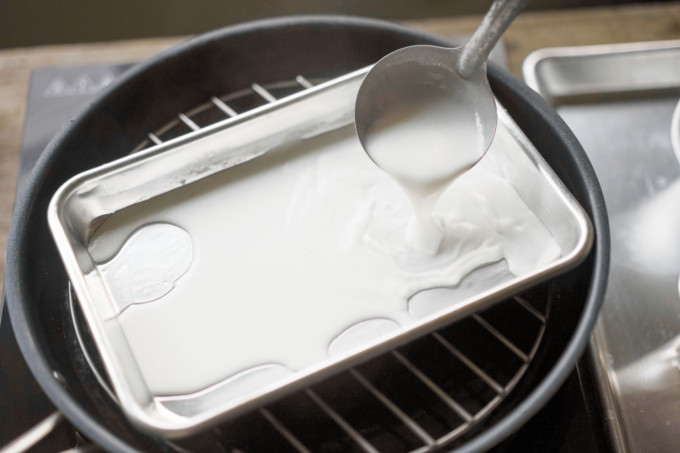
Step 3. Then, add enough rice noodle liquid to cover the bottom of the tray (try to use as little as possible so your rice paper doesn’t end up being too thick). I like to move the saucepan around so that it covers evenly.
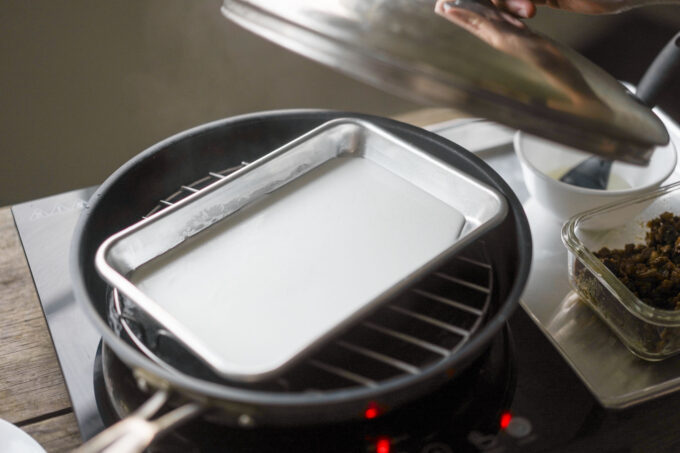
Step 4. Place the lid on top and steam for about two minutes. After two minutes, check to see if your rice paper is beginning to form. If you move the tray around and most of the liquid stays put, you can sprinkle your filling over the rice paper. If it’s still very liquidy and/or not sticking to the corners, place the lid back on and steam for another minute and re-check.
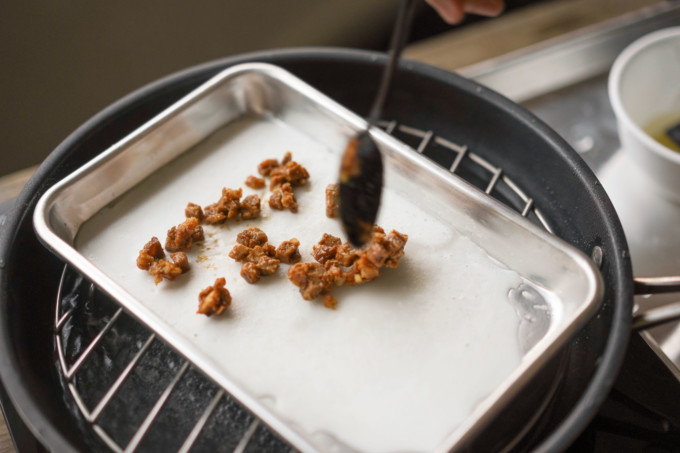
The goal is to add the filling while its still slightly tacky, so it sticks to the batter. For this recipe, we used char siu. Then, close the lid again and steam for an additional five minutes.
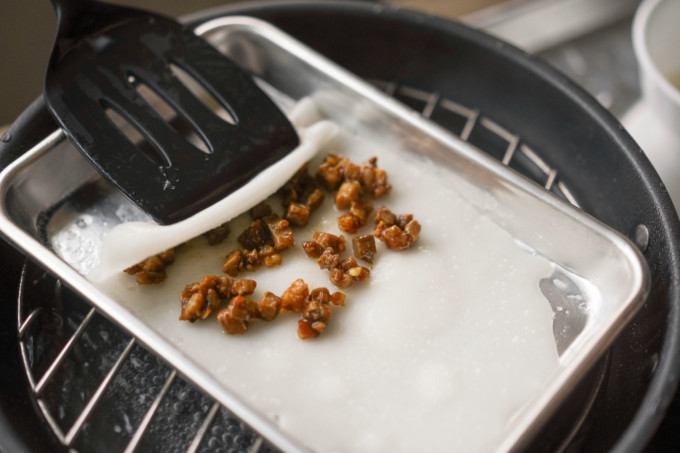
Step 5. Remove the lid after it’s finished steaming. It should look firm and slightly translucent, and you typically see large bubbles underneath the rice noodle throughout. Using a silicone spatula, carefully lift one side of the rice noodle (preferably the shorter side), and fold it over itself by one inch and continue to roll until you reach the other end. Use the spatula to lift the cheung fun from the tray to your serving plate.
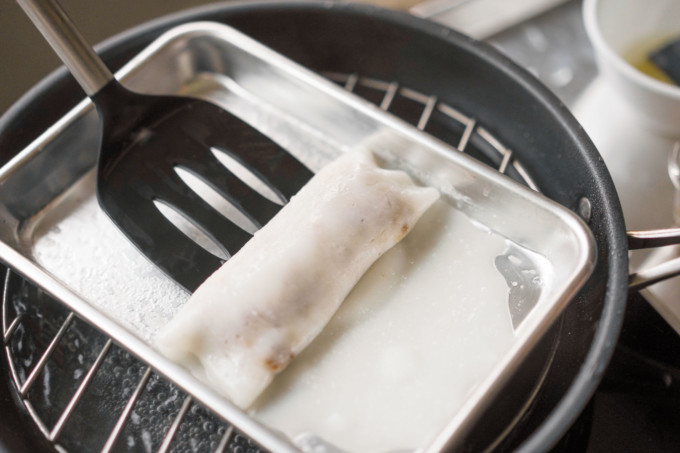
Step 6. Before serving, I found that if you leave the roll to rest for about two minutes, the texture firms a bit and you get the perfect combination of soft and chewy rice noodles. Drizzle the sauce on top of the cheung fun. I like to add some chopped scallions for extra color.
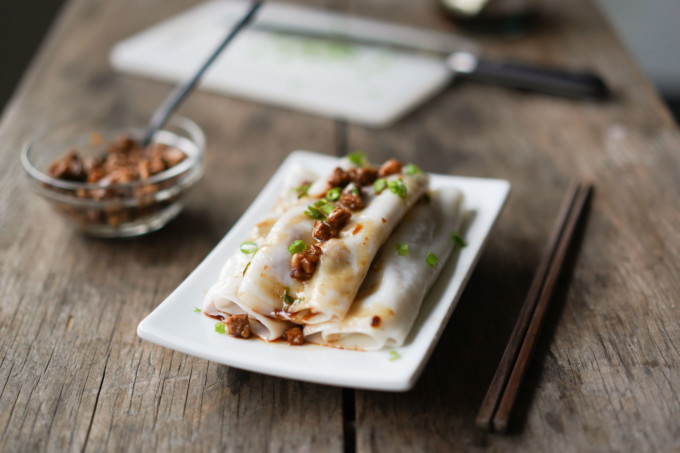
Cheung fun char siu is best served with other dim sum recipes like chicken feet, char siu bao, pork and shrimp shumai, egg tarts, Chinese broccoli and with oyster sauce, and xiao long bao. To learn how to best eat cheung fun with chopsticks, read my chopstick tutorial.
What is a fun roll?
A fun roll is also called cheung fun or cheong fun. It’s a thinly steamed rice paper that is filled with various ingredients like shrimp, meat, vegetables, and even fried dough, and then rolled or folded. It’s primarily eaten as a snack or for breakfast in Chinese restaurants or from street carts in Asia.
Is chee cheong fun gluten free?
Yes, the rice noodle roll in chee cheong fun is gluten free because it uses a mixture of rice flour, tapioca starch, and potato starch. However, if you use a seasoning sauce, please note that most soy sauce does contain gluten so please check the ingredient list.
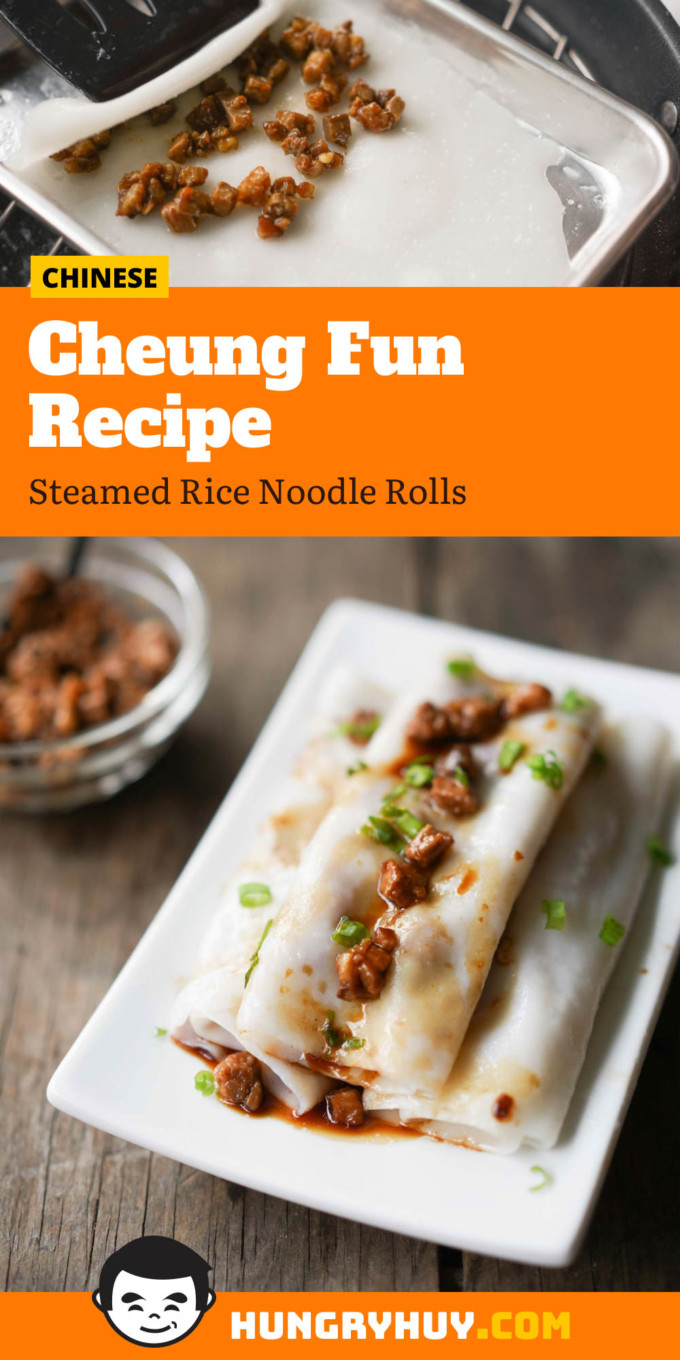
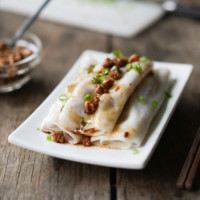
Cheung Fun / Steamed Rice Noodle Rolls (w/ Char Siu Pork)
Ingredients
Rice noodle batter
- ½ c rice flour
- 3 tbsp potato starch
- 2 tbsp tapioca starch
- 2 tbsp glutinous rice flour
- ½ tsp salt
- 2 c water filter
Char siu filling
- ½ lb char siu chopped into small pieces
- 1 tbsp oyster sauce
- ½ tbsp light soy sauce
- ½ tbsp dark soy sauce
- 2 tsp sugar
- 1/16 tsp five spice powder
- 1 clove garlic minced
- 1 tsp sesame oil
- ½ tsp cornstarch
- 4 tbsp water
Seasoning sauce
- ¼ tbsp dark soy sauce
- ¼ tbsp light soy sauce
- ¼ tsp sesame oil
- ½ tsp sugar
- 1 tbsp water
- ½ tbsp oyster sauce
Assembly
- vegetable oil
- scallions chopped
Instructions
Rice noodle mixture
- In a large mixing bowl, add 72 grams of rice flour, 16 grams of tapioca starch, 28 grams of potato starch, 16 grams of glutinous rice flour, and ½ teaspoon of salt. Blend all dry ingredients together.
- Add the two cups of filtered water in the dry ingredient bowl and whisk together. Rest the liquid for at least 20 minutes on the counter.
Char siu filling
- Chop your char siu into small pieces about three millimeters.
- In a saucepan, add one tablespoon oyster sauce, ½ tablespoon light soy sauce, ½ tablespoon dark soy sauce, two teaspoons sugar, 1/16 teaspoon five spice, one clove minced garlic, and one teaspoon sesame oil and mix thoroughly. Cook this on medium-high heat.
- Mix ½ teaspoon cornstarch and four tablespoons water in a separate bowl and add into the saucepan. When the mixture reaches a boil, lower to medium heat and continue to cook for another two minutes or until the consistency is similar to molasses.
- Add half pound char siu pieces to the pan and cook for an additional minute.
- Remove the char siu filling from the heat and allow it to rest on the counter.
Seasoning sauce
- In a small saucepan, add ¼ tablespoon of dark soy sauce, ¼ tablespoon of light soy sauce, ¼ teaspoon of sesame oil, ½ teaspoon of sugar, one tablespoon of water, and ½ tablespoon of oyster sauce. Heat over medium-low heat and stir until the sugar is dissolved. Remove from heat and place into a container to cool until assembly.
Assembly
- Assemble your steamer, if you purchased a steamer set-up follow the instructions. If you’re using a tray and a saucepan follow the instructions. Place the wire rack on the saucepan and add enough water so that it sits directly underneath the wire rack. Add the tray on top (making sure it fits inside), then add the lid on top. Pre-heat this steamer before steaming any liquids.
- When your steamer is nice and hot, open the lid. Brush on some vegetable oil on the tray.
- Use the whisk to combine all the starches and flours that have settled to the bottom of the mixing bowl before adding the liquid onto the pan. Scoop enough liquid so that it covers the tray. If need be, move around the tray so that the liquid is evenly spread out.
- Cover the tray with the lid and steam for about two minutes. After two minutes, check to see if the rice paper has firmed enough so that there is less liquid moving around. Test this by moving the tray around. If there is too much liquid and it is not sticking to the tray, place the lid back on and steam for an additional one or two minutes. Once it’s firm enough, sprinkle the char siu filling evenly across the rice noodle. Cover the steamer again and steam for an additional five minutes.
- When the rice noodle is finished steaming, take a silicone spatula and carefully lift one side of the rice paper (the short edge). Fold about one inch of rice noodle over itself and continue to roll until it reaches the other end. Carefully lift the rice noodle roll and place in a serving dish.
- Let the steamed noodle roll rest for about two minutes before consuming, this allows for the texture to firm. Drizzle the seasoning sauce over the roll and add some chopped scallions if you want. Serve and enjoy.










Great recipe! Thanks for the thorough instructions.
Thanks for the comment Baha’s–I caught your share on IG too, looking good!